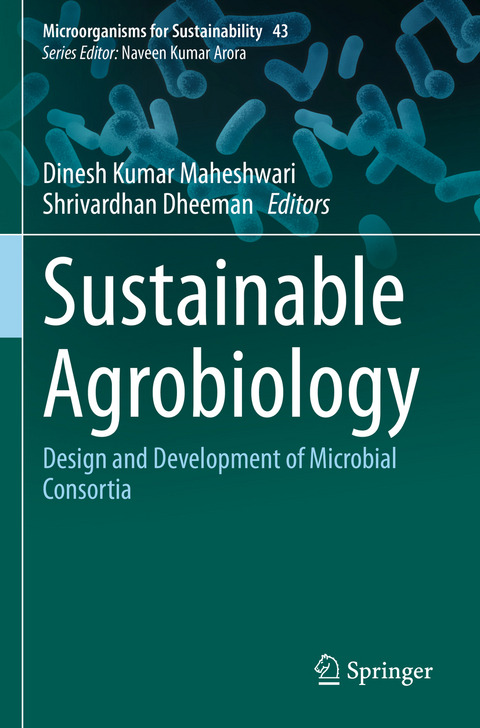
Sustainable Agrobiology
Springer Verlag, Singapore
978-981-19-9572-9 (ISBN)
Essential information is provided on ecological management by consorted mechanisms of rhizobacteria that directly affect ‘agriculture sustainability’ and an individual chapter is devoted to the understanding of future research, and addressing bottlenecks and successful steps.
This book assists the academicians, researchers and NGOs in negotiating the steep learning curve involved in gaining the skills needed to perform design and development of microbial consortiums, preparation of PGPR-based fertilizers, which offers significant advantages in terms of pertaining novel knowledge on the groundbreaking research, still ongoing.
Prof. (Dr.) Dinesh Kumar Maheshwari, former Vice- Chancellor (Gurukula Kangri Deemed to be University, Haridwar) a renowned Botanist and Microbiologist, is holding MHRD-UGC-BSR Eminent Faculty Fellowship after his superannuation. Prof. Maheshwari worked in Biology Research Centre (Szeged), Hungry in the year 1983-1984. He was Visiting Professor, Science University of Tokyo, Noda (Japan), University of Ulm (Germany), University of Gent (Belgium), University of Barcelona (Spain), University of Tokyo (Japan), Daegu University (Korea). He has received several recognitions and has been awarded “Prof. Y.S. Murty Medal” and most prestigious ‘Birbal Sahni Award’ of Indian Botanical Society in the year 1992 and 2018 respectively, for his outstanding contribution. Dr. Shrivardhan Dheeman is working as an Associate Professor in the Department of Microbiology, School of Allied Health Sciences, MVN University, Palwal, Haryana, India. Dr. Dheeman has researchinterests in Plant-Microbe Interaction and Microbial Ecology. He is involved in teaching Microbiology and Biotechnology to different disciplines in undergraduate and post-graduate classes. Dr. Dheeman was nominated for “Young Scientist” of Indian Science Congress in the year 2016 for his outstanding contribution to Microbial Diversity and Plant-Microbe Interactions.
1. An Overall Insight into the Attributes, Interactions, and Future Applications of ‘Microbial-Consortium’ for Plant Growth Promotion, with Contemporary Approaches.- 2. Beneficial Microbial Mixtures for Efficient Biocontrol of Plant Diseases: Impediments and Success.- 3. Rhizobacterial Mediated Interactions for Enhanced Symbiotic Performance of the Root Nodule Rhizobia in Legumes.- 4. Plant Growth Promoting Bacterial Consortia Render Biological Control of Plant Pathogens: A Review.- 5. Phytohormonal Role of Microorganisms Involved in Bioinoculants.- 6. The Bacterial-Fungal Consortia: Farmer's Needs, Legal and Scientific Opportunities, and Constraints.- 7. Sustainable Improvement of Productivity and Quality of Agricultural Crops Using a Microbial Consortium.- 8. Consortia of Probiotic Bacteria and their Potentials for Sustainable Rice Production.- 9. Strategies to Evaluate Microbial Consortia for Mitigating Abiotic Stress in Plants.- 10. Co-inoculation of Rhizobacteria in Common Bean (Phaseolus vulgaris) Production in East Africa.- 11. Management of Sustainable Vegetable Production Using Microbial Consortium.- 12. Consort Interactions of the Root Endophytes Serendipita spp. (Sebacinales, Agaricomycetes, Basidiomycota) with Crop Plants.- 13. Applications of Microbial Consortia and Microbiome Interactions for Augmenting Sustainable Agrobiology.- 14. Effect of Microbial Consortium Vs. Perfected Chemical Fertilizers for Sustainable Crop Growth.- 15. Bioencapsulation of Biocontrol Agents as a Management Strategy for Plant Pathogens.- 16. Designing Tailored Bioinoculants for Sustainable Agrobiology in Multi-stressed Environments.- 17. Development and Application of Consortia Based Microbial Bioinoculants for Sustainable Agriculture.
| Erscheinungsdatum | 28.03.2024 |
|---|---|
| Reihe/Serie | Microorganisms for Sustainability |
| Zusatzinfo | 32 Illustrations, color; XVI, 405 p. 32 illus. in color. |
| Verlagsort | Singapore |
| Sprache | englisch |
| Maße | 155 x 235 mm |
| Themenwelt | Naturwissenschaften ► Biologie ► Mikrobiologie / Immunologie |
| Technik ► Umwelttechnik / Biotechnologie | |
| Weitere Fachgebiete ► Land- / Forstwirtschaft / Fischerei | |
| Schlagworte | Biofertilizers • bioremediation • Co-inoculation • Microbial consortium • Plant growth promoting rhizobacteria • plant-microbe interaction • rhizosphere |
| ISBN-10 | 981-19-9572-9 / 9811995729 |
| ISBN-13 | 978-981-19-9572-9 / 9789811995729 |
| Zustand | Neuware |
| Informationen gemäß Produktsicherheitsverordnung (GPSR) | |
| Haben Sie eine Frage zum Produkt? |
aus dem Bereich


